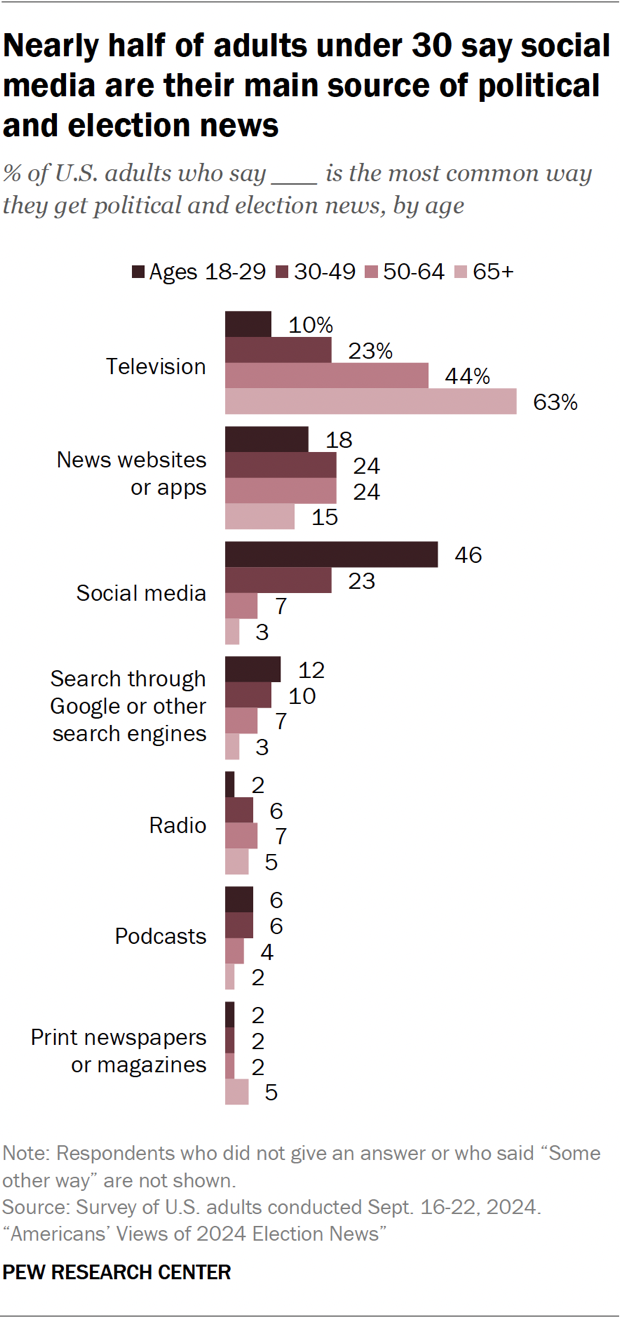☀️ Happy Thursday! The Briefing is your guide to the world of news and information. Sign up here!
In today’s email:
- Featured story: Podcasts are playing a key role in the Harris and Trump campaigns
- New from Pew Research Center: Americans’ sources for presidential election news
- In other news: The White House joins Reddit
- Looking ahead: OpenAI announces deal with Hearst
- Chart of the week: The platforms Americans use to get election news vary by age
🔥 Featured story
Kamala Harris has given several interviews this week after generally avoiding media appearances since becoming the Democratic presidential nominee. This includes an appearance on Call Her Daddy, a podcast popular mostly with young women. Meanwhile, Donald Trump has also appeared on a series of podcasts with younger audiences.
Podcasts have become a common part of younger Americans’ media diet in recent years, according to a 2023 Center study. A 2024 survey found that about a third of U.S. adults under 50 (34%) say they at least sometimes get news from podcasts, higher than the share in older age groups. And 6% of American adults under 50 say podcasts are their most common source of political and election news.
🚨 New from Pew Research Center
As Americans navigate the abundance of information about this year’s presidential election, many of them are seeing news they think is inaccurate – and having a hard time distinguishing fact from fiction. Our new survey looks at Americans’ views and consumption of election news.
Among the key findings:
- Overall, about seven-in-ten Americans say they are following news about the candidates in the 2024 presidential election very (28%) or fairly (40%) closely. This is up from 58% in April and 65% in July, mirroring a pattern also seen in 2020 in which attention increases closer to Election Day.
- About three-quarters of U.S. adults (73%) say they have seen election coverage that they think is inaccurate at least somewhat often. And roughly half (52%) say they generally find it difficult to determine what is true and what is not when getting election news.
- Views toward election coverage often differ by party. For example, more than half of U.S. adults say the media have done very (13%) or somewhat (45%) well covering the election. But Democrats are about twice as likely as Republicans to hold this opinion (77% vs. 39%).
Read more about how Americans are getting news about the 2024 U.S. presidential election here.
📌 In other news
- The White House is sharing hurricane information on its new Reddit account
- Brazil lifts ban on X after company complies with court orders
- The role of amateur radio in the aftermath of Helene and Milton
- Fox News to debut Spanish-language program
- Social media influencers are reshaping the political news landscape
- Local Ohio newspaper spread dubious claims about solar power amid fossil fuel campaign
- Disagreement at CBS over Ta-Nehisi Coates interview
📅 Looking ahead
OpenAI recently announced its latest content partnership with a media company. The deal with Hearst will enable content from dozens of the company’s publications, including the Houston Chronicle, Esquire and Cosmopolitan, to be used by ChatGPT and other products.
Americans are slightly more likely to say that artificial intelligence helps people in their ability to find accurate information online (33%) than to say that it hurts (27%), according to a 2023 Pew Research Center survey. But many Americans are still unsure about the impact of AI in this area and several others.
📊 Chart of the week
This week’s chart looks at the very different ways that younger and older Americans are getting news about the presidential election. In a new Center survey, nearly half of U.S. adults under 30 (46%) name social media as their most common source of election news. But among U.S. adults ages 65 and older, a majority (63%) say TV is their top source.
👋 That’s all for this week.
The Briefing is compiled by Pew Research Center staff, including Naomi Forman-Katz, Jacob Liedke, Sarah Naseer, Christopher St. Aubin, Luxuan Wang and Emily Tomasik. It is edited by Michael Lipka and copy edited by Anna Jackson.
Do you like this newsletter? Email us at journalism@pewresearch.org or fill out this two-question survey to tell us what you think.
